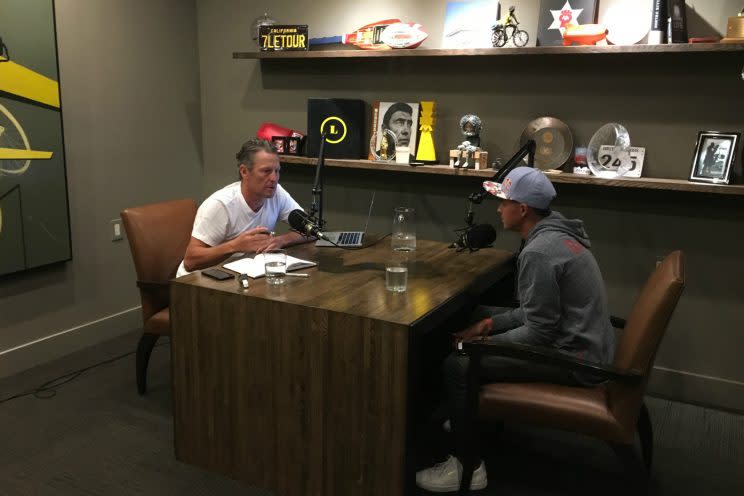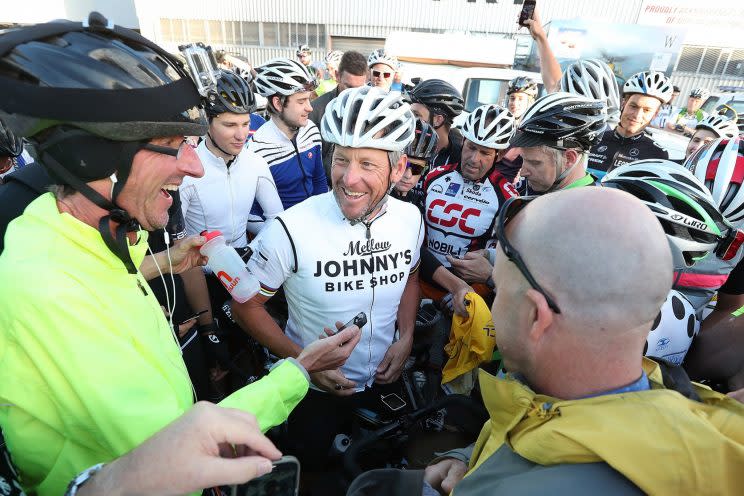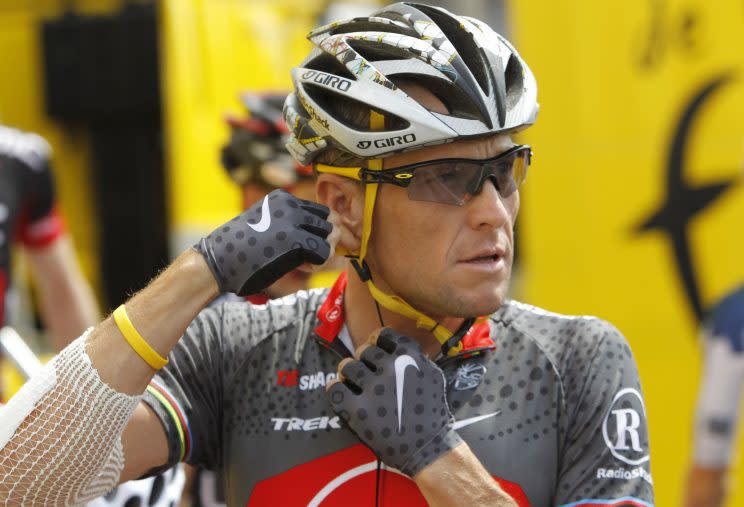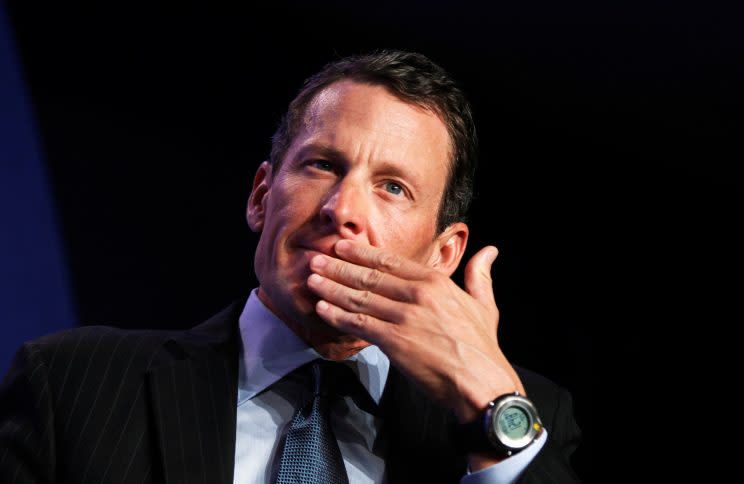Lance Armstrong opens up about his comeback — as a podcaster

Lance Armstrong is a year into his comeback — but not exactly the kind he envisioned.
Last year, the former competitive cyclist started a podcast and interview show called “The Forward,” a weekly long-form interview show hosted by Armstrong featuring a mix of athletes (Brett Favre, Rickie Fowler, Becky Hammon and Bo Jackson), actors (Ben Foster), authors (Malcolm Gladwell), entrepreneurs (Gary Vaynerchuk), musicians (the Avett Brothers) and politicians (Wendy Davis and Rahm Emanuel) as well as local celebrities from in and around his hometown of Austin, Texas. (Tim League, founder of the Alamo Drafthouse, was Armstrong’s first guest.)
At the time of its launch, Armstrong called the podcast “a gentle step out” into the public eye after several years of self-imposed exile following his admission of cheating during each of his seven Tour de France titles.
But Armstrong’s name will be back in the headlines soon. He’s the defendant in an upcoming $100 million federal lawsuit brought against him by the U.S. Postal Service, which claims it was defrauded in its sponsorship of Armstrong’s U.S. Postal Team as a result of the scandal. In 2012, an investigation by the U.S. Anti-Doping Agency concluded Armstrong had spearheaded “the most sophisticated, professionalized and successful doping program that sport has ever seen.” He was subsequently banned for life from professional cycling.
And this summer, Armstrong will be doing something he hasn’t done in any substantive way since receiving his lifetime ban: He’s going to be talking about the Tour on a new daily podcast — called “Stages” — that he plans to post within an hour of the finish of each stage of the three-week race, which begins July 1.
The move is, in part, a response to what Armstrong believes has been a concerted effort to whitewash his legacy.
In a wide-ranging interview, the 45-year-old father of five opened up about sports, doping, parenting, politics, music and much more from Carson City, Nev., where he was competing in a nonsanctioned mountain-bike race.

Yahoo News: Did you ever imagine you’d be doing an interview pegged to your podcast? When you started it, you called it a “gentle step out.” Do you still feel that way?
Lance Armstrong: Yeah, I didn’t know what to expect, to be honest. I didn’t try to get too far out of my lane when I started, not knowing actually what to do. I’ve been surprised at how it’s gone, how it’s been received.
So, 50-something podcasts in, what have you learned, now being on the other side of interviewing?
You know, yeah, I mean, the tables are completely turned. I was interviewed for 30 years. So it’s a totally different dynamic. Mainly I guess my biggest surprise is how the guests have been really open about a lot of things. I think that’s surprised people. And I don’t know why that is, but to me, that’s been the most rewarding part — to just get people to give it up in these conversations.
Did you listen to podcasts before you started yours? And if so, who did you listen to?
No, I didn’t, and I never did and I still don’t. I wish that I did, and every day I tell myself I need to start doing that, but if I’m in my car I listen to music.
I understand you’re going to do a podcast during the Tour. What’s the idea behind it?
Yeah. It’ll essentially be a spinoff of “The Forward.” It’s tough to call it live, almost impossible, but it’ll be a short, concise recap show of the day.
Is it something you’ve been itching to do, to get your voice into cycling analysis?
I wouldn’t say I’ve been itching or dying to do it. The last four years I really haven’t followed much cycling, and literally to this day I don’t follow a ton. But last year, I found myself watching more of the Tour. And so the idea behind the Forward was that it was a forward discussion. It wasn’t a cycling discussion. It wasn’t to talk about the past, rehashing things that have already been extensively published. But any time I touch on cycling, whether it was the podcast with all my old teammates or any kind of cycling discussion, the reaction is pretty overwhelming. And so, I thought, “What if the fans, the Tour fans, what if they had another option for a recap show?” I don’t love the NBC coverage. I think there’s a lot that can be improved there. So I decided to go for it this summer and we’ll see, well, most importantly we’ll see if I’m good at it or if I suck at it. And then secondly we’ll see how it’s received.
You mentioned the NBC coverage. Do you feel like your name is being intentionally omitted from their broadcasts?
That’s a fair question. We’ll see what happens this summer. I don’t have to speculate, none of us need to speculate on the last [four] summers. I mean it’s pretty well known that my name is not allowed to be mentioned. Period.
Is that anecdotal or have you heard that from someone at NBC?
Yeah. That’s a fact. Which, whatever. That seems a little odd but that’s the position NBC Sports has taken.
[Editor’s note: An NBC Sports spokesman refuted Armstrong’s claims. “This is completely false,” the spokesman said. “Lance Armstrong has been mentioned on our telecasts over the past four years and likely will be moving forward if the context is appropriate.”]
How about in general? Do you feel like your history in the sport is being erased?
Honestly, I think that was the intention, right? I mean, I’m not taking the position that it was all unfair and I got screwed, but the statement that I’m making is, certainly [the] intention [of UCI, cycling’s governing body] at the time was to erase everything. The trick for them has proven to be and will continue to prove to be is that you can’t. You have a few things happening. One, you have a very, very iconic event [in the Tour de France] that has to have a winner. Has to. You can’t erase something and not. You can’t turn the pencil around and write something — you can’t do that for that event. So, and then where it really gets tested is with the people. So the people, you can’t erase their memories. Not to say that they excuse it or that they forgive it or they understand it — none of that. It’s just they have memories. And so, long term, you just can’t erase it. You can try, but over time history corrects itself. And just my own — I’m not the right person to take a view on this, but my sense is that we are already starting to see that.
History correcting itself.
Yeah, the hysteria dies down, the screaming dies down and then people look at it and rational adults go, “OK.” When everybody’s done screaming — look it happens everywhere. Look at politics. Look at the situation we’re in now where everybody is screaming. At some point that’ll stop and they’ll go, “All right. Now what do we do?”

Do you miss the sport of cycling?
I don’t miss being in the grind, I don’t miss being in Europe and that nomadic lifestyle — I don’t miss that at all. And I’m not unhappy with where I sit today. I mean, look at the reality. I’m in Carson City, Nev., and I’m gonna race my bike tomorrow against thousands of people. I feel like I’m ingrained in cycling. I mean, I’m not in Germany at the start of the Tour de France, but I still own multiple bike shops [Austin-based Mellow Johnny’s], I’m still a factor in this industry. I don’t feel like I’m not involved.
You mentioned the political environment, and right now we have a president who has been accused by many people of lying. What are your thoughts on President Trump?
I mean [long pause] there’s no upside for me to comment on — I don’t need to add to the noise, for lack of a better word. And obviously I’m in the middle of a significant legal situation with the Department of Justice. I’ve always tried to stay somewhat apolitical. I mean, privately I have my views and people that know me know my views, but … all I’ll say is it’s a messy situation and I’m not, you know, I don’t think our counterparts around the world view us too kindly right now, which is unfortunate.
I wanted to ask you about Maria Sharapova, who recently returned to tennis after being suspended for two years for doping, only to have the French Open not give her the chance to qualify. Have you followed her case? How do you think she’s been treated?
I can see it from all sides. I can understand, I mean, I’ve watched her reaction. I’ve watched some of the other players’ reactions that have been negative towards her, which you could expect. And then you’ve got the reactions of these event organizers. And they get to decide — whether it’s the French Open, I don’t know, it could be Indian Wells, it could be the f***ing Backyard Open, I don’t care. It’s [their] event, they get to decide. You can’t fault them for that either. It didn’t surprise me that the French Open took that position. Just knowing the organizers of the Tour De France as well as I do, that’s a position they love to take. But I suspect she’ll get more invitations down the road. The biggest issue for her is going to be how well she plays. I think she’s injured now, or had gotten injured. If you don’t come back to the highest level, everything goes away. The invitations go away, the sponsors go away, that’s just the nature of professional sport.
You’ve said before that during the scandal, your kids started getting teased at school, and how that was a poignant moment for you, when you spoke with them about it. I know you’ve talked about that, but what do you tell your children about drug use in general?
You know, I don’t know where you’re trying to go with this, but what I say to my kids is up to me, and what I choose to share is up to me and nobody else.
I was going to ask you about your son, who I understand plays football, and what, as a parent, you think about the safety of that sport, given the national debate over head injuries. It seems to be a conversation that every family with a child playing football is having.
As a parent, you want your kids to be as safe as they can. If my son plays football or if my 8-year-old goes and rides a bike — you have to wear a helmet and stay out of the street. Luke has chosen to play football. You know, I had this conversation with somebody yesterday. I mean, he’s never had, to date — knock on wood — a head injury. And I don’t know that he’ll play past the high school level. So as a parent, you’re sitting there saying, “OK, he’s playing a sport, he’s focused on it, it’s keeping him” — you know, I think sports are good for kids to keep ’em focused on something besides getting in trouble. And so, I’m happy for him now. And I think he’s not one of these unrealistic kids. He doesn’t think he deserves a scholarship to the University of Alabama or anything. He knows where he fits in and where that’s going to take him.

How about you — you’re biking a lot, obviously. How do you as a 45-year-old stay in shape? Do you still run regularly?
No, not anymore. I got hurt running, so I’m back to just riding my bike basically.
You’ve been doing this podcast for a year, had a lot of interesting guests. Who’s on your wish list? Who would be the one living person you’d love to have on your podcast?
That’s a good question. Because there’s obviously a lot of people you’d like to have on. And then there are the conversations that I have in my head. Like, for example, and this is not on the top of my wish list, but you’ve probably followed this Megyn Kelly–Alex Jones drama, right?
Yep, we covered it.
I can only imagine. And you’ve seen the furor over that, which I think NBC deserves, by the way. If you’re a parent at Sandy Hook and someone says [that the shooting was staged] as a parent, I would go crazy. I mean, you wouldn’t be able to … yeah. A guy like that saying those things, you better bring it. I’m getting a little off the subject here, but those are not the types of interview I’ve done, where there’s been any intensity. All of them have been pretty friendly. Yeah, I totally, I’m getting a little off the subject. Sorry.
No problem.
You know who I’ve tried to get and I’ve had multiple conversations with and she just didn’t want to do it — and by the way, I don’t blame her at all — is Amanda Knox. Because I’d love to have that interview. I’d even want to interview George W. Bush, who I consider a friend. I think he’d probably want to do it. But why would he do it? Like, a lot of people in this world get to a place where [they say] “Why? Why do I this? What’s in my interest to do it?” And a lot of times it just falls to a place where it’s like, there’s just no need. “Yes, we’re friends, yes, we’re homies, but there’s no upside for me.”

Who would be the non-living person you’d like to interview if you could?
Hmm. [long pause]
These are classic interview questions, by the way. “Who would you want to go back and meet if you could?” I haven’t listened to all your podcasts, so I’m not sure you’ve asked questions like that.
No, I haven’t but I’m getting some good ideas. I’m going to steal your ideas.
Feel free. Please do.
Um, well, if I could talk to Kurt Cobain, that’d be pretty great.
That’s a good one. I stole that particular question from an interview New York magazine did with David Letterman, and he said the person he’d love to interview — if it wasn’t Trump — was Bob Marley. So you’re kind of on the same wavelength.
That’s an interesting answer for him. Well, he’d be a great interview. More than anything, I love just the images of him. He looks like Santa Claus now.
Right, he looks like he’s having a great time being retired.
As he should!
OK, so this is the last question, another from the classic interview playbook. If you could map out the next 10 years, what would they look like?
Well, I say it all the time. The most important part is the kids. Taking care of them. You know, my son — 10 years from now, I could be a grandparent. You know, 27-year-old son, 25-year-old girl, 10 years from now I have young kids that are getting out of high school, so making sure that all navigates is the most important part. And then, for the first time ever in my life, I have a completely blank canvas. I can really do whatever I want to do. I can continue to do the podcast or start a new business or — it’ll look very, very different. If I look back five years ago to today, the world looks very different. And so, um, 10 years from now, the world is going to look drastically different than it is today. But, I guess I have an open mind towards that, where in the past I had a very rigid view of where I wanted to be, what I wanted to happen. And at this point, I’m pretty laid back about it and understand it’s not so much about what I want to do, it’s more about what the world will allow me to do. And that’s just a very different mindset from what it used to be.


